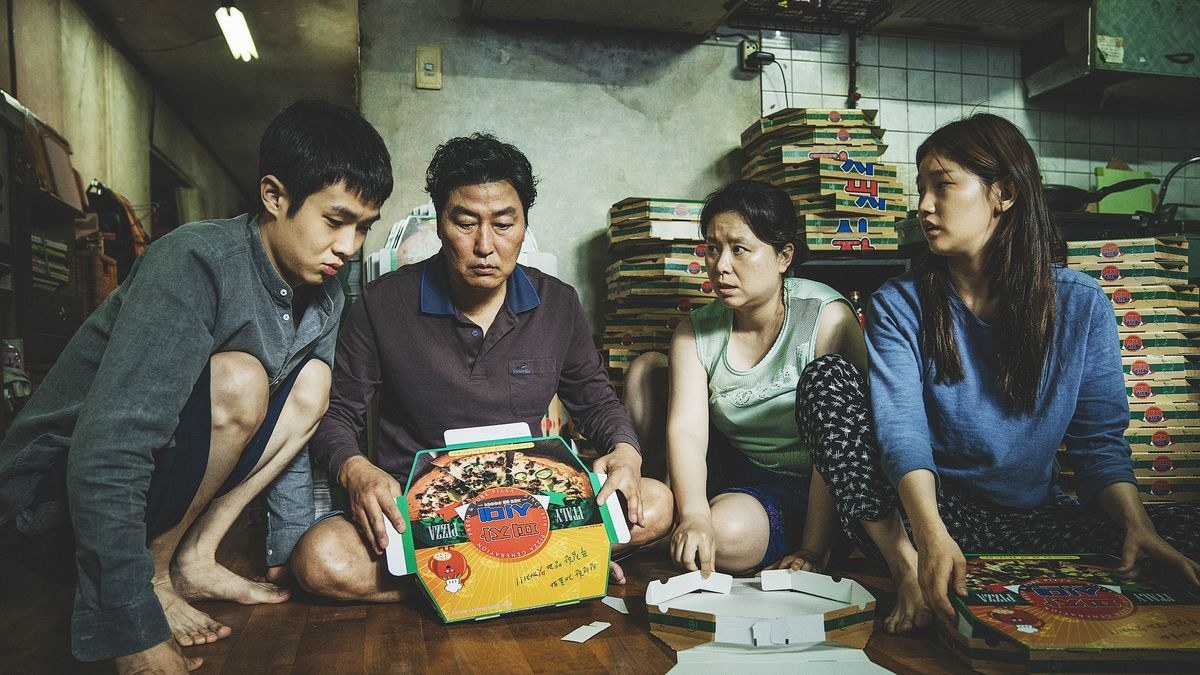Since its Palme d’Or–winning premiere at Cannes in May, Bong Joon-ho’s Parasite has blazed through the international festival circuit. The film, which arrives in US theaters today, has been hailed as a portrait of class warfare that trades in excoriating satire and violence. It is a tale of two families, living in present-day South Korea, twinned in their desires. Both want material comfort and security, and both know the difficulty of staying alive in the 21st century without a certain amount of money. The two families are separated by class, education, and a sizable hill. One is pretty rich, and one is pretty poor. By the end of the film, they end up destroying each other.
But before the blood begins to pool, Parasite opens with all the humor and familiarity of a Danny Ocean heist. It features, like many entertaining films do, a band of underdogs on the brink of their first and greatest con. The Kims live in a basement apartment overrun by stinkbugs, where the foursome make a paltry wage by folding pizza boxes. Though the family is close, their lives are strained by certain subterranean indignities. They must crouch in a corner of the bathroom to get Wi-Fi. There is a neighborhood drunkard, whose favorite spot to urinate is the Kims’ street-level window. Ki-woo (Choi Woo-Shik), the entrepreneurial son, is exasperated by this state of affairs, but his parents (Song Kang-ho and Jang Hye-jin) are more resigned. They have cycled through a series of failed careers, and at each stumble, their abandonment by the Korean state has been made more and more complete.
Yet a film that begins in a basement has only one direction in which to move: up. When Ki-woo’s lies his way into a gig as an English tutor for a wealthy family, the Kims begin their slow ascent out of destitution. Ki-woo’s employer, Mrs. Park (Jo Yeo-jeong), is a familiarly bourgeois type, the prim housewife who imagines unseen, malevolent forces besieging her privileges, and secretly thrills at any news of their growing encroachment. Ki-woo convinces her that the Parks’ youngest could benefit from the attention of a renowned “art therapist” named Jessica (Park So-dam), supposedly a favorite among Korea’s stroller-pushing elite.
“Jessica” is actually Ki-woo’s sister, armed with a photoshopped art school degree (she gets the job after telling Mrs. Park that her son may have schizophrenic tendencies). She and Ki-woo are soon installed as regulars in the Parks’ hilltop home, where they pick at fresh fruit and cultivate a deepening reliance on their employers. If the siblings lack real qualifications, they thrive in the looser meritocracy of the scam, which rewards charisma and natural wit. Within a couple weeks, Ki-woo and his sister, whose real name is Ki-jung, oust the Parks’ chauffeur and housekeeper and smuggle in their parents as replacements. The Parks now have a second family living under their patronage. Instead of the rookie stuff of art museums or casinos, our protagonists interlope across an entire socioeconomic structure.
For a prestige film about Korea’s class divide, Parasite’s first hour feels oddly like a guilty pleasure. It is pleasurable to see rich people get taken advantage of. It is pleasurable to watch someone tell a really good lie. It is pleasurable, if naive, to imagine that a shadow meritocracy exists alongside our long-defunct traditional one and that the marginalized can still leverage talent to clamber out of hardship. Yet Parasite is a self-aware heist movie, and it knows that inequality can’t be resolved through a series of ploys; the system self-corrects too swiftly for that. We see the Kims avail themselves of the Parks’ spacious garden and bathtub for 10 minutes before the mansion’s former housekeeper — remember her? — returns with an agenda of her own. The film, along with our unearned pleasure, begins to unravel as the Kims fight to maintain the small gains they’ve made.
Bong has described his script as something that was “growing up inside” him and that he had to “yank” out of his mind. His analogy encapsulates the myths late-capitalism breeds into all of us — myths which subsist so stubbornly that they can only be extracted through some judicious bouts of bloodletting. The Kims got out of their basement because of their ingenuity, but at the expense of other working-class people. Parasite forces the Kim family, and the audience, to reckon with this domination by literalizing it in punches, in choreographed brawls, in scenes where one person must sit on the actual back of another. Meanwhile, for the majority of the film, the wealthy Parks exact the subjugation of those below them without inflicting a single bruise.
This is not because they are more refined in virtue or by class; rather, as Parasite underlines, the violence of late-capitalism is most visible to those struggling at the bottom, while cloaking itself in motifs and allusions for the benefit of those at the top. Mrs. Park is as oblivious to the Kims’ designs as she is to her own parasitical reliance on their labor and emotional comfort. For decades, we’ve been selling ourselves the same script about smart people getting shuttled out of poverty, often by fancifully benevolent patrons. Bong runs this convention like a well-loved tape before blasting it into terrifying white noise.
Today’s media coverage of real-life scams, wrought by ingénue heiresses and the planners of bankrupt music festivals, has perpetuated a Hollywood-esque fixation on the individual: Who are these people? How did they get in? Scammerfare turns the con artist into society’s most fascinating character study, a psychological black box of audacity and deceit. It turns an otherwise overwhelming object of analysis — late-capitalism’s arbitrary, self-perpetuating class divide — into a human interest story. We can’t account for the material excess and perverse accumulation that structure these scams, but we can talk about the outfits Anna Delvey wore to court. Often, this feels like all we can do. These frauds allow us to obsessively sketch their outlines even as we ignore how the negative space around them is the same negative space around us: capitalism, with all its oppressive predictability.
If the summer of scam hadn’t already ended, Parasite delivers it a fatal kick down the stairs. The film ultimately proves more interested in exposing the mechanical churn of a class system than the psychology of those trying to game it. It is worth nothing that the Kims and the Parks seem, at times, interchangeable. Each a perfect nuclear family (mother, father, brother, sister), they are equally beautiful and affectionate, equally confident and well-dressed (“Jessica’s” stylish rotation of clothes is the least realistic element of the film). Parasite’s protagonists have been vacated of moral sensibility, of any distinguishing marker that isn’t related to the constant struggle to survive. The family members’ personalities are mainly determined by class, not by emotions or private backstories. As one character puts it, the Parks are not nice despite being rich — they are nice because they’re rich.
Reducing characters to their socioeconomic positions allows the film to stage a critique of inequality without having to tether it to a relatable or virtuous hero. In one memorable series of intercuts, Bong contrasts the Parks’ minimalist mansion with a public gymnasium in the Kims’ neighborhood, where residents have sought shelter from a recent flood. We see a walk-in closet stocked with silk, and then a crowd of people rummaging through piles of clothes on the ground. It is one of the film’s more sickening visuals, powerful for how it lets objects speak for themselves, without an intervening (and untrue) story about “deserving” or “undeserving” people.
Throughout the film, Ki-woo frequently exclaims certain moments of his dramatic arc to be “so metaphorical!” Parasite, meanwhile, is trying to be as literal as possible. Bong places his upper-class family on a hill and relegates the lower ones to basements. Socioeconomic violence equates to physical violence. In several scenes, characters use a light switch to tap out Morse code through an overhead lamp in the Parks’ mansion. The wealthy homeowners find this eerie flickering simply that: eerie, an ominous aesthetic that could suggest ghosts or latent domestic unease. For the Kims, the light is a literal SOS, beamed out to an unreceptive void. When it comes to class, Parasite suggests that the more complex a metaphor, the more pain is sequestered out of sight.
Writing in the Los Angeles Review of Books, critic Seo Hee Im describes Parasite as “punching down” because it pushes internecine fighting on its lower-class characters while rarely implicating the wealthy Parks. Yet the violence doesn’t feel remarkable for its direction — “punching down” being capitalism’s basic operating model — but its excesses.
Parasite ends in tragedy, after multiple household items have been wielded as skewers and several people have died in front of their loved ones. In its ruthlessness, Parasite recalls the extremes of The Square, another Palme d’Or winner that lacerated a bourgeois and ineffectual art world without much pity for its characters. The Square, though it was not bloody, stretched encounters to their most antisocial limit, suspending audiences in discomfort, hinting they were weak — as bourgeois as the film’s subjects — if they tried to look away. This is a cinema of cruelty, and sometimes the corollary it imagines between brutality and profundity strengthens its very real critiques of society’s hypocrisies. Sometimes, though, Parasite feels like the work of a boy auteur, burning an ant with his magnifying glass. Other times, this type of film is so lacerating, so numbing in how it withholds redemption or tenderness, that the evil it illustrates seems to offer no exit. At the critique’s deep-sea bottom lies nihilism. In the apt words of Ki-woo’s father, speaking at Parasite’s crescendo, “nothing fucking matters.” ●
read more
- Scammers: They’re Just Like UsTom Gara · June 5, 2018
- A YouTuber Has Been Accused By Fans Of A Scam After Her Louis Vuitton Giveaway Turned Into A MessTanya Chen · Oct. 9, 2019
- Elizabeth Holmes’ Scam Is Over, But Her Story Will Go On ForeverAlison Willmore · March 16, 2019
Zoe is a graduate student researching 20th-century histories of anti-imperialist literature. You can find her on Twitter @zoe_hu_
Contact Zoe Hu at [email protected].
Got a confidential tip? Submit it here.
Source: Read Full Article





